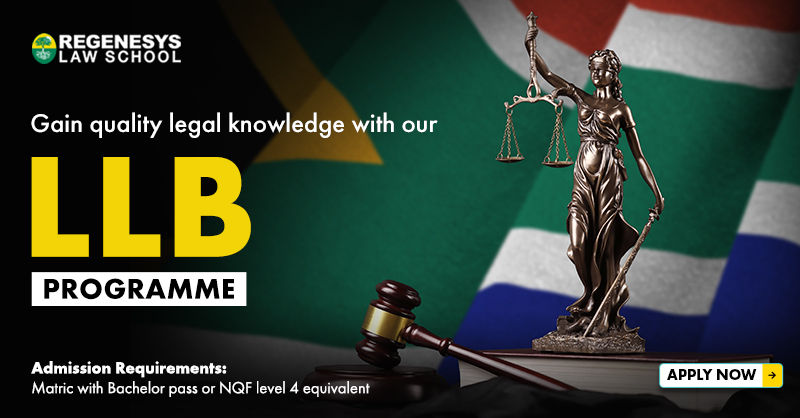A legal education in South Africa holds significant prestige and offers strong career potential. South Africa’s Bachelor of Laws (LLB) represents a gateway to respected professions in law, governance, and compliance. With a robust economy, evolving regulatory frameworks, and increasing complexity in public and private sectors, there is growing demand for qualified legal experts. Pursuing an LLB degree opens avenues into careers in the public and private sectors, reflecting the versatility of an LLB qualification. However, before committing, learners must grasp their investment and its expected return.
In this article, we will explore the LLB programme fees in South Africa, the value behind the investment, and potential career outcomes, while guiding you toward quality programmes.
Table of Contents
- Overview of the LLB Programme
- What Do LLB Programme Fees Typically Include?
- Hidden and Additional Costs Students Should Plan For
- Online vs Contact Learning: Cost Considerations
- Financial Aid, Bursaries, and Flexible Payment Options
- Is the Investment Worth It? Long-Term Career Outlook for LLB Graduates
- Choosing the Right Institution Based on Value, Not Just Fees
- Conclusion
- LLB Programme Fees in South Africa – FAQs
Overview of the LLB Programme
The Bachelor of Laws (LLB) in South Africa is a four-year undergraduate programme designed to provide a comprehensive understanding of legal systems, principles, and applications.
It typically includes modules in constitutional, criminal, contract, property, and administrative law, as well as legal research and advocacy. At Regenesys Law School, the LLB programme is aligned with NQF Level 8.
The programme is designed to be offered in contact and online study formats, making it accessible to a larger number of aspiring lawyers who choose Regenesys Law School. The Regenesys LLB programme fees in South Africa are also competitively priced, reflecting the institution’s commitment to expanding access to quality higher education.
The programme is accredited by the Council of Higher Education (CHE) and registered with SAQA, ensuring that it meets national academic and regulatory standards.
Listed below are the LLB requirements for admission to the Regenesys programme:
- Matric with a Bachelor’s pass or an NQF level 4 equivalent qualification
- English 1st – 50% | English 2nd – 60%
- A levels for International students (Africa)
- Higher level pass for international students 26 APS
- Competent in Mathematics, English, written and oral communication skills at NQF Level 4
- Basic computer skills, internet connection and relevant IT resources
Read more on What is a Bachelor of Laws (LLB) degree?here!

What Do LLB Programme Fees Typically Include?
When evaluating LLB programme fees in South Africa, it is important to understand the full scope of what your financial commitment may cover. Although actual amounts differ by institution, most law programmes involve a combination of mandatory and optional costs. Knowing these components can help students prepare their budget and avoid unexpected expenses throughout their legal studies.
Below is a breakdown of the typical cost categories included in LLB programme fees in South Africa:
1. Tuition Fees
- Covers the cost of academic instruction for each module or year
- Includes lectures, seminars, legal skills training, and online learning platforms
2. Registration Fees
- A one-time or recurring administrative charge for enrolling in the programme
- Often payable at the start of each academic year or semester
3. Learning Resources and Materials
- Access to digital libraries, course materials, e-books, and case law databases
- May also include printed textbooks or learning packs, where applicable
4. Examination and Administration Fees
- Charges related to assessment administration, exam logistics, and grading
- Includes academic record keeping, module results, and certification processing
5. Technology and Support Services
- Costs related to student portals, IT assistance, and learning management systems
- May include technical support for online classes and exams
6. Optional Academic and Extracurricular Activities
- Moot court participation, legal clinics, law student societies, and competitions
- Skills development workshops, guest lectures, and professional networking events
These elements contribute to the overall value of the qualification, and learners are encouraged to evaluate each one when comparing LLB programme fees in South Africa. While not all institutions will charge for every item separately, understanding these components enables better financial planning and informed decision-making.
Read more on Can I Study LLB Part-Time? A Guide for Working Professionals in the Legal Fieldhere!
Hidden and Additional Costs Students Should Plan For
In addition to LLB programme fees in South Africa, prospective LLB students must be aware of various hidden or supplementary expenses that can arise throughout the course of their studies. These are not always itemised in the initial fee structure but can significantly affect the total cost of completing the programme. Accounting for these factors is an important part of preparing for the full financial commitment of pursuing a law degree.
Here are some common additional costs to consider when reviewing LLB programme fees in South Africa:
1. Study Materials and Legal Textbooks
Students are usually required to purchase textbooks, legal commentaries, or prescribed reading materials.
2. Digital Equipment and Internet Access
A reliable computer or laptop with sufficient processing capacity is necessary for attending virtual lectures, completing assignments, and accessing legal databases.
3. Travel and Accommodation
Students attending in-person or contact sessions may need to budget for daily travel, or in some cases, temporary accommodation near the campus.
Factoring in these additional and often underestimated expenses provides a more realistic view of the total financial investment. By preparing for both visible and hidden costs, students are better positioned to manage LLB programme fees in South Africa in a way that aligns with their academic and personal goals.
Read more onLLB Career Advantages: Benefits of Holding an LLB Degree here!

Online vs Contact Learning: Cost Considerations
When exploring LLB programme fees in South Africa, the study format plays a significant role in the overall affordability and student experience. Each delivery format carries its own cost implications, advantages, and limitations. Understanding these differences can help students select an option that aligns with their financial circumstances, lifestyle, and learning preferences.
Regenesys Law School offers flexible study modes, which allow students to balance quality education with personal obligations, while making informed decisions about total costs.
The table below outlines the factors that can make a difference in LLB programme fees in South Africa between online and contact LLB programmes:
|
Aspect |
Online Learning |
Contact Learning |
|
Tuition Fees |
Generally lower due to reduced infrastructure and overhead costs |
Often higher to cover campus facilities, staffing, and in-person resources |
|
Travel & Transport |
Not required; students can study from home |
Students may incur daily transport or relocation costs |
|
Accommodation |
No on-campus housing required |
May require additional costs for housing near the institution |
|
Technology Needs |
Requires investment in a laptop, webcam, and stable internet |
Less reliance on personal tech, but still useful for coursework |
|
Access to Lecturers |
Virtual interaction through scheduled webinars and forums |
In-person engagement through live lectures and consultations |
|
Peer Interaction |
Digital communication via group chats and forums |
Face-to-face collaboration and classroom discussion |
|
Study Flexibility |
High – suitable for working adults or those with family responsibilities |
Structured schedule, ideal for those preferring a fixed academic routine |
|
Learning Environment |
Independent, self-driven with virtual support |
Campus-based with access to libraries, study rooms, and student services |
While online study typically reduces LLB programme fees in South Africa through savings on travel and accommodation, it also requires upfront investment in digital tools and greater self-discipline. On the other hand, contact learning offers a more immersive academic environment, but it comes at a higher logistical and financial cost.
Financial Aid, Bursaries, and Flexible Payment Options
Regenesys Law School is committed to making legal education more accessible through affordable LLB programme fees in South Africa and a range of financial support mechanisms. Eligible students may apply for loans that can assist with tuition fees, subject to specific terms and conditions.
In addition, we also offer flexible payment plans, allowing students to spread the cost of their studies over manageable monthly instalments. These financial aid options are designed to reduce the burden of upfront costs and support students in achieving their academic goals without financial strain.
The table below highlights the various student loan options that Regenesys students can explore that will allow them to better manage their LLB programme fees in South Africa:
|
Plan |
Details |
|
Student Hero |
One-stop platform to compare loan offers from banks and alternative lenders |
|
Fundi |
Covers tuition loans only; also offers device loans, accommodation and eBooks |
|
Capitec Education Loan |
Education term loan up to R500,000 at fixed interest, with up to 84-month repayment |
|
Nedbank Education Loan |
Loans up to R400,000 with flexible repayment schedules and competitive rates |
|
Regenesys FlexiPay Instalments |
Monthly payments, semesterly, annual, or upfront fee plans; requires debit order and proof of income |
Read more on Best Student Loans in South Africa – Learn How to Make the Correct Choice here
Is the Investment Worth It? Long-Term Career Outlook for LLB Graduates
Pursuing an LLB is not only an academic commitment but also a strategic investment in a future legal career. In South Africa, the LLB qualification opens the door to a variety of respected LLB jobs. Graduates can choose to pursue roles as attorneys or advocates, each requiring further exams after completing the degree.
Beyond traditional legal practice, LLB graduates are also well-positioned for careers in corporate governance, public policy, human rights advocacy, and legal consultancy. The versatility of the degree enables graduates to contribute meaningfully across sectors.
The table below lists LLB careers in South Africa that graduates can explore and their expected average annual income. These figures have been gathered from multiple sources and are accurate as of July 2025.
|
Job Roles |
Average Annual Income |
|
Law Professor |
R809,043 |
|
Legal Researcher |
R388,214 |
|
Legal Adviser |
R467,934 |
|
Prosecutor |
R935,689 |
Read more on What Comes After LLB? Exploring Career Paths and Opportunities
Choosing the Right Institution Based on Value, Not Just Fees
While LLB programme fees in South Africa are an important consideration when selecting a law school, aspiring legal professionals should not pick the cheapest LLB programme in South Africa. They should also weigh the overall value offered by the institution, such as the quality of academic instruction, industry relevance of the curriculum, student support services, graduate employability, and flexibility in study modes.
Regenesys Law School distinguishes itself by offering a high-quality, accredited LLB programme that is both academically rigorous and practically aligned with the needs of South Africa’s legal system.
Listed below are some highlights of the Regenesys Law programme:
- Accreditation and Credibility
- Career-Aligned Curriculum
- Flexible Study Format
- Affordable and Accessible
- Experienced Faculty and Supportive Environment
- Holistic Development and Future-Focused Learning

Conclusion
Understanding LLB programme fees in South Africa means seeing them as comprehensive investments in your career. Beyond tuition, include administration, learning resources, and living costs, especially for contact-based study. Seek out programmes that balance quality with affordability and provide practical learning, financial support, and flexible delivery.
By researching, planning carefully, and selecting a forward-thinking institution such as Regenesys, you can confidently embark on a rewarding journey in law.
Visit the Regenesys Law School website to learn more about our LLB programme and apply for the upcoming intake.
LLB Programme Fees in South Africa – FAQs
What is the typical duration of an LLB programme in South Africa?
The LLB is usually a four-year undergraduate degree. At Regenesys Law School, the programme follows this structure and is aligned with NQF Level 8 standards.
What are the minimum academic requirements for admission into the LLB at Regenesys?
You need a Matric with a Bachelor pass or an NQF Level 4 equivalent. International students require A-levels or a higher-level pass with a minimum of 26 APS.
What do LLB programme fees in South Africa generally include?
LLB programme fees in South Africa typically cover tuition, registration, learning resources, examination administration, and access to student support services and technology platforms.
Are there any hidden or additional costs students should plan for?
Yes. These may include legal textbooks, personal technology (laptop, internet), transport or accommodation (for contact study), and materials for moot court or legal clinics.
Does Regenesys offer financial aid or payment options?
Yes. Regenesys provides flexible payment plans, and students can apply for third-party funding through Fundi, Student Hero, Capitec, and Nedbank, among others.
How does online learning compare to contact study in terms of cost?
Online study is generally more cost-effective due to lower transport and accommodation expenses. However, students must invest in digital tools and maintain a reliable internet connection.







